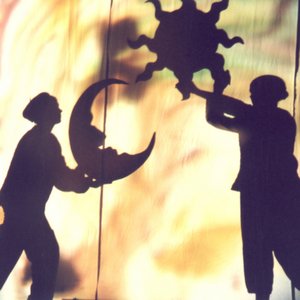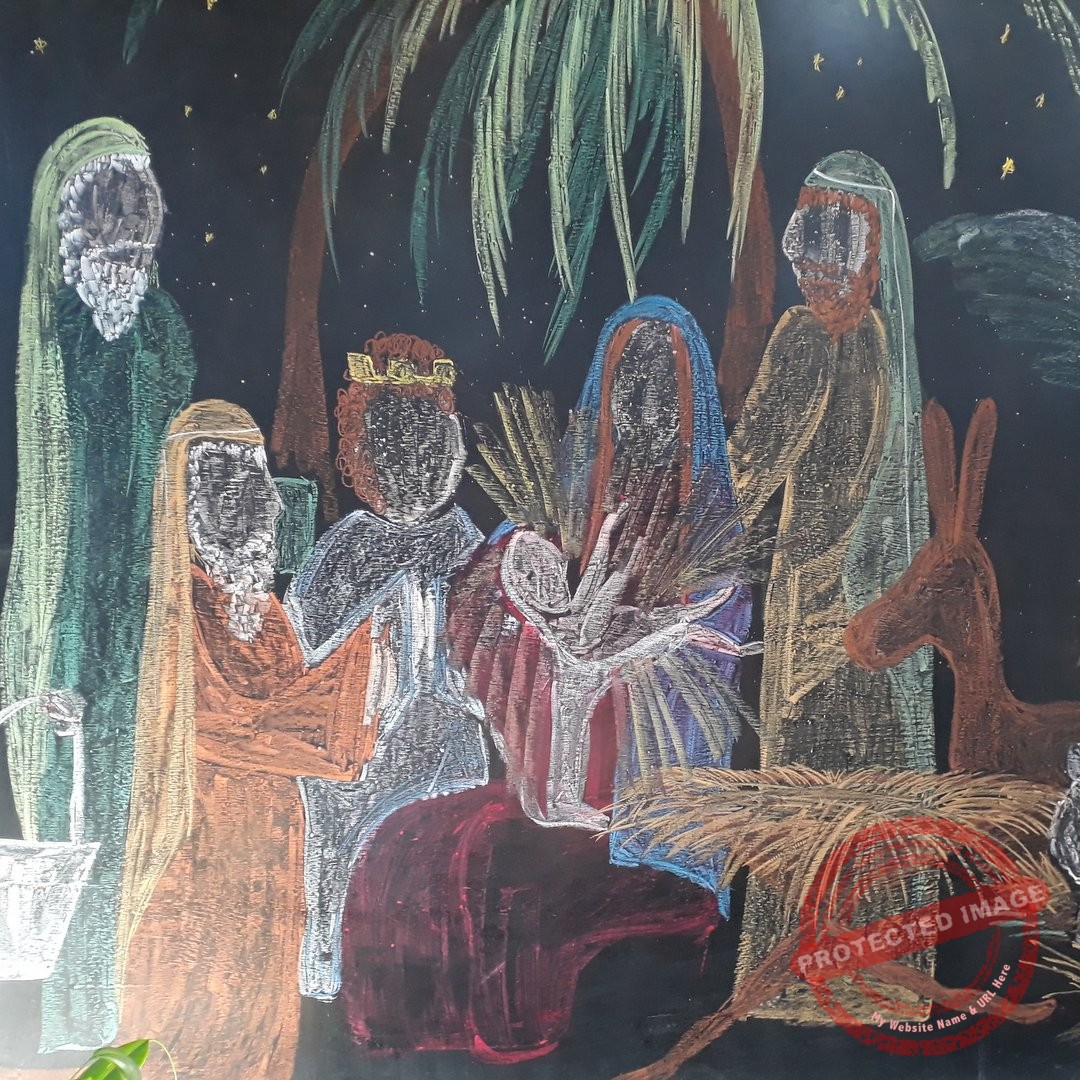[print-me target="body"]
play by Ruth Salles
This play is based on a legend by the famous Swedish writer Selma Lagerlöf¹. Born in 1858, she was a teacher and fought for world peace and the emancipation of women, and in 1909 she received the Nobel Prize for Literature. Their sagas, Christian legends and other legends are beautiful, full of exuberant fantasy and deep love. This play was written in German by a teacher from a Waldorf school, whose name has not come to our attention. Taking advantage of the subject of the legend, the teacher included a bit of history in the play. My Portuguese version has the dialogue phrases shortened, but contains a little more of the legend itself, in the words of the first song and at the end of the piece; it also contains excerpts from Virgil's 4th eclogue, said to be messianic, in addition to some notes from a Hebrew song and the final Gregorian chant, given as being authored by Saint Ambrose (Aurelius Ambrosius, 340-397). The translation, which I found, of Virgílio's eclogue is by the Portuguese poet Leonel da Costa Lusitano².
CHARACTERS:
Choir (spoken and sung).
Virgil (at first with writing instruments).
Augustus, Agrippa and Maecenas.
Marcellus and Claudius (after their part they can be two foreign priests).
Writer (with board or parchment, where he reads).
Roman priest (has some written sheets under his arm).
sibyl
Priest of Zeus (brings an oak leaf).
Priest of Apollo (brings a bay leaf).
Priest of Poseidon (brings the trident).
Priest of Hermes (brings the Caduceus).
Priest of Demeter (brings a branch of wheat).
Priest of Mithras (brings a knife).
Priest of Adonis (brings the anemone flower).
Priest of Osiris (brings the scepter of Osiris).
Priest of Isis (brings the crown of Isis).
Priest of Horus (brings lightning).
Judean man.
Gaul man.
German man.
Mary, Joseph and the Angel (with the manger).
The colors of the costumes are in charge of the eurythmy teacher.
Instrument: lyre, zither or flute.
INTRODUCTION
(The choir speaks, while Virgílio, alone in front of the scene, sits on a bench, writes and meditates.)
CHOIR:
- The final age has come
which the Cumaan Sibyl prophesies.
O generation of the gods, look at the world
which is about to fall under its own weight!
Favors the Child who is already born!
It is the Iron Age that ends.
Gold begins.
This boy brings with him the virtues of his Father
and come to rule the world.
Oh, if I have time to tell of your exploits...
Begin, O thou little boy,
to meet the Mother with joyful laughter!
(Virgil may join the chorus.)
CHORUS (sings):
“It was in the time of Augustus,
Emperor of Rome:
the strangest night descended on earth...
What dark, impenetrable darkness! What a silence...
Rivers did not flow in their beds;
the waves didn't roll there on the beach;
the grass did not grow; the wind did not blow;
all nature stopped…
expected...
Only in the palace of Augustus,
emperor of rome,
no one even felt
didn't even realize
the strangest night on earth
was already down.”
SCENE 1
(Virgil, Augustus, Agrippa, Maecenas, Claudius, Marcellus, and the scribe stand out from the choir. In the scene there must already be, in addition to Virgil's bench, the throne of Augustus. Augustus can start talking to Agrippa while the others enter. Then they all stand and listen to the scribe's reading.)
AUGUSTUS (to Agrippa):
– The great day is near, Agrippa
the opening of the Pantheon,
the dome with which we honor Rome!
And it was you, Agrippa, the builder
of such a sacred temple. Inside him,
all gods shall be honored.
(to the clerk):
– Announce, scribe, our plan
and read our will to the citizens!
CLERK (reading formally, facing the public):
“With the help of the gods, I managed to end two centuries of unrest.
Now, no revolt disturbs the welfare of the provinces.
Yes, the war is over! I can close the doors of Janus' temple.
A new era has begun.
For that, we want all the gods of the Empire to be praised with the same glory and gratitude.
To this end, Agrippa built the great dome through which the light of heaven enters. Pantheon will be its name.
The people of Rome will have to know the sacred ceremonies of the most unknown gods of this empire.
Let there be a feast for four days! Rome will revere the gods again!
(Augustus sits on his throne.)
AUGUSTO:
– You, Claudio, organize the whole party!
CLAUDIO:
– I will put all my efforts into this company.
AUGUSTO:
– Let Marcelo be the ornament of the squares and temples!
MARCELLO:
- I only wish that my work pleases the Emperor.
AUGUSTO:
– Agrippa will bring me the priests of every people in this vast Empire.
AGRIPPA:
– I will, sir.
AUGUSTO:
– Marcelo, bring me our priest with his books.
Get out now!
MARCELO (to Claudio):
- We will. (Marcelo and Claudio leave)
AUGUSTO:
– But you,
Virgil, Agrippa and Maecenas, wait.
My faithful helpers, I have tested you in these bloody times we have passed.
From Agrippa helped me swift action,
of Maecenas, cunning and prudence.
With Virgil I gained wisdom.
So I ask you today,
on this solemn day for all:
is Rome protected by the gods?
SPONSORS:
– Augustus, you can see for yourself,
how poets tune strings
and like the deeds of the ancestors
by expert men are written.
If it's a new era that begins,
how can the gods be far away?
AUGUSTO:
– Patronage is right. And then, Agrippa?
AGRIPPA:
– As a man of action, I say that the summit in charge of me is ready.
May the images of the gods be placed within it!
Being praised, Rome is safe.
AUGUSTO:
- Speak, Virgil!
VIRGILIO:
– Augustus… My friends…
Let the two of us talk alone.
AGRIPPA:
“Let's go then, Maecenas. (Agrippa and Maecenas leave)
VIRGILIO:
- Oh, Augustus!
I don't know if the gods protect us,
but one thing i know.
AUGUSTO:
– Say it, then!
VIRGILIO:
– New times will come. and we are all
in the midst of transformation.
Add into the abyss all that was ancient.
What is new and what is unknown emerges.
But who can know what is new?
AUGUSTO:
– I read the Sibyl's prophecy,
but there are no books in which they spoke
of Rome's fate in such a change.
MARCELLUS (enters with the Roman priest):
– Sir, I bring you our priest. (he leaves again)
ROMAN PRIEST:
- Sir…
AUGUSTO:
– Come on in! Come in good time.
Did you bring the holy books?
ROMAN PRIEST:
– Yes, however…
Rome's fate was written in the books that the Sibyl destroyed,
for at that time the king of Rome would not pay their price for them.
This is our sadness: the books of destiny of this time are lost.
The gods were silent...
AUGUSTO:
– And the Sibyl?
ROMAN PRIEST:
— Came to Rome other times, in aid;
but men cannot see it any more.
And also the oracles of Greece were silent.
The gods hid themselves, more and more, even from the priests!
AUGUSTO:
– Man already despises what is sacred…
But if the gods are silent, it is man who must act.
(stands up and speaks firmly) I will take all men back to the old gods!
VIRGILIO:
– In our newly built Pantheon, therefore, may the gods be worshiped!
(thoughtful)
But where to find the god of the new times?
AUGUSTO:
– I also ask myself this question.
Only a sign from heaven will answer.
Let's keep our eyes wide open!
(Augustus and Virgil sit down in a serious and thoughtful attitude. The Roman priest stands to the side with his head bowed.)
SCENE 2
(The Sibyl enters and speaks to the audience. Augustus, Virgil and the priest, in an attitude of recollection, neither see nor hear her.)
SIBILA:
– I, the Sibyl, will return to men,
bringing my help and my advice.
I return to Rome, city so loved,
between seven hills placed!
To the landscape of Lazio I will return,
where Aeneas set foot on solid ground.
Here also founded his son Ascânio Alba Longa.
Here, Romulus and Remus were also raised by the wolf.
And seven kings reigned.
But the man could see me less and less.
Just kids sometimes.
And today I enter the palace of the Roman Emperor,
but no one sees me or can hear me.
Poor mortal beings sons of men...
(The Sibyl sits on the floor in a corner of the scene. Enter Maecenas and Agrippa.)
SPONSORS:
– Emperor Augustus, I bring here
a wish of all friends...
AUGUSTO:
– Does such a desire refer to you?
AGRIPPA:
– No. To you.
AUGUSTO:
- Then I answer you:
“We will always speak last of me.”
– Maecenas, bring in the clerk. (Patron leaves and returns with the clerk)
(to the clerk):
– Say, scribe, don't you have the table where all foreign priests are registered by order?
CLERK:
– Oh, yes, and they wait in the anteroom.
AUGUSTO:
– Then, my dear Agrippa, go and call them!
PRIESTS (entering):
– Glory to the Emperor! Peace and fortune!
AUGUSTO:
- Be welcome. I thank them.
Then show images of your gods.
CLERK:
– Priests of Greece, present yourselves!
SAC FROM ZEUS:
– From Zeus, the king of the gods, I bring the leaf of the sacred oak of Dodona.
SAC FROM APOLLO:
— Of Apollo the enlightened,
it is the laurel of Delphi that I bring you.
SAC FROM POSEIDON:
— Of Poseidon, who reigns over the seas,
I bring you the trident.
SAC FROM HERMES:
— Of Hermes, who is the god of skill,
I bring the caduceus.
SAC FROM DEMETER:
– Of Demeter, who makes plants grow,
brought the golden wheat.
SAC MITER:
—Of the god Mithra, who fights for good,
brought the knife with which he defeated the bull.
MECNAS (to the scribe):
– Where does this one that advances now come from?
CLERK:
– It comes from the island of Cyprus. Let him speak!
SAC FROM ADONIS:
— Of Adonis, slain by a boar,
I bring the anemone. It's the risen god!
CLERK:
– Priests of Egypt, present yourselves!
(The priests of Egypt speak slowly, solemnly, and at length.)
SAC FROM OSIRIS:
– I bring the scepter of Osiris, king of the dead and lord of the skies!…
SAC FROM ISIS:
– I bring the crown of Isis, mistress of Nature!…
SAC OF HORUS:
– I bring a ray of the rising sun, from the god Horus,
the evil victor, the hawk-headed one!…
Horus!… Son of Osiris and Isis!
May the three stand side by side in the Pantheon!…
CLERK (calls after a pause):
– Who came from the province of Judea?
MAN FROM JEWISH (enters slowly, speaks in a calm voice):
- Pardon, Emperor,
for coming here empty handed.
AUGUSTO:
– So you don't have any pictures?
JEWISH MAN:
- I don't have. Is written…
AUGUSTO:
– Written where?
JEWISH MAN:
— Our holy books say this:
“Thou shalt not make for thyself any figure,
nor the image of your Lord and God!”
SPONSORS:
- It's very weird…
AUGUSTO:
— Then, in our temple,
surely we will not have the image
of this god of Judea…
JEWISH MAN:
– Our eyes cannot see him.
However, for once we are going to see His Son.
So it is written.
AUGUSTO:
– Written where?
JEWISH MAN:
— In the book of Isaiah the prophet:
“From the stock of David shall come a shoot,
a branch will come out of its roots
and from that branch, a fruit where it rests
the Spirit of strength and counsel,
and the fear of God.
(At that moment, Virgílio, who had said nothing since the beginning of the scene, as if wakes up and talks to Augusto.)
VIRGILIO:
– Listen, Augusto, this is the new era!
AUGUSTO (thoughtful):
- The new era…
(to the Judean Man):
- And this divine Son
when will you come?
JEWISH MAN:
- Sir, they are very dark
the words of the prophet. they say
that we will prepare the way.
We put our hope in this, for it was said: (recites and retreats)
“Those who wait on the Lord will obtain
new forces will fly like eagles,
they will run without weariness.” (he backs off)
CLERK:
– Enter now who represents Gaul!
GALIAN MAN (approaches and speaks seriously, firmly):
– The gods of Gaul
are long dead,
and I bring you nothing.
VIRGILIO:
– Dead?!
MAN FROM GALIA:
– Yes, dead.
Yes, Rome killed them.
AUGUSTO (hearing murmurs):
- Silence! (to the Man from Gaul): – Explain yourself better, Gaul!
MAN FROM GALIA:
– I was born in Gaul, in the famous Alesia.
That same day the gods died.
Caesar won
and Vercingetorix sacrificed himself.
Ah, with our hero the city fell;
our priests are all dead;
sacred forests were cut down;
stones used for sacrifice
were desecrated.
Our gods all, broken images,
turned to dust!
VIRGILIO:
– Will you never return, then, your gods?
MAN FROM GALIA:
– Never again!… But an ancient legend
account that from Heaven will come down one day
a holy hero,
who will be Lord of all peoples!
VIRGILIO:
– When will it be?
MAN FROM GALIA:
- Oh, I do not know. (he backs off)
AUGUSTO:
– This future time is very uncertain…
CLERK:
– Let the Man from Germania come now!
GERMANIAN MAN (approaching):
– We have no images of the gods in Germania.
They don't exist there!
We worship the gods with beautiful sacrifices
on mountain peaks,
in the woods where the crystalline waters shine.
Inside the Pantheon…
the sacred forests of Germania do not fit!
SPONSORS:
– Proud boy! Do we renounce, then, the barbarian gods of the north?
GERMANIAN MAN:
“I don't even know if the gods still have their former strength.
It is the twilight of the gods that comes with the new times.
VIRGILIO (again astonished):
– Twilight of the Gods? New Times?
GERMANIAN MAN:
– Yes, the old songs refer to this:
that, after twilight, the gods resurrect.
(recites stressing the stressed syllables):
“In the fields the sleeping gods awake;
and the gods speak of the god to come.”
MECNAS (as if discovering something):
– Yes, the god who will come!… But that one, Augustus, will be you!
AUGUSTO:
– Maecenas, say nothing.
Man must not compare himself to the gods.
(Gesture for the Man from Germania to continue.)
GERMANIAN MAN:
- The god to come
extends power to everything and everyone,
decide battles, recreate peace! (draw back)
VIRGILIO:
– This is the new age, the golden age,
that must return, as old legends tell us.
AUGUSTO:
- We're done for now.
I thank you gentlemen. Can go.
Then they will be told of the places
that, there in the Pantheon, will have the gods.
PRIESTS AND FOREIGN MEN:
– We salute our great Emperor! (They leave with the clerk.)
SPONSORS:
– My dear Augustus…
AUGUSTO:
- Speak, I hear.
SPONSORS:
– Augustus, our great Emperor,
the people of this Empire consider him
like this god who was to come.
Let, then, O Augustus, let the Romans
may already venerate him as a god!
(At these words, the Sibyl rises as if preparing to act.)
SPONSORS (cont'd):
– Let his image be placed in the great Pantheon;
each province sacrifice to Augustus, the new god!
AUGUSTO (serene, addressing the others):
– Many times the gods have guided me,
but I always felt just a man.
Thank you very much for your words,
but none of this is accomplished.
They know very well that it is contrary to Roman law.
AGRIPPA:
- No! For Romulus, the founder of Rome
was worshiped as god Quirinus!
AUGUSTO:
– Friends, follow me! in the temple,
I will worship our ancient gods
and ask them what their wish is.
SCENE 3
(August, Virgil, Maecenas, Agrippa and the Roman priest walk around, as if outside, in the night. They begin to wonder how everything looks. The Sibyl follows them at a distance.)
ROMAN PRIEST:
– How dark… What silence…
AGRIPPA:
- not heard
the old river Tiber murmuring…
VIRGILIO (looking up):
– Strange night… Even in the air you feel
that something new is being prepared.
AUGUSTO (looking down):
– Everything stopped… Nature, static,
It looks like you're expecting something terrible!
SPONSORS:
– I say that I expect something wonderful:
Augustus as god consecrating himself!
AUGUSTO:
– Silence!… I hear the voice of someone singing.
CHORUS (singing the lullaby notes softly):
“Nan, nan, nan, nan, nan, nan, nan, nan, nan…”
AGRIPPA:
- I do not listen anything.
VIRGILIO (astonished):
- But nature
move now!! the breeze blows,
the river flows, the trees shake!
Something wonderful has happened!…
MECNAS (agitated):
- It's the sign that Augustus will be god!
The gods answer us! Hail, Caesar!
In the Pantheon we will have your image!
CHORUS (sings the lullaby notes again, softly):
“Nan, nan, nan, nan, nan, nan, nan, nan, nan…”
AUGUSTO:
- Silence! I hear the voice of someone singing
as mothers sing when rocking a child...
(At that moment, the Sibyl approaches and stands before the Emperor and Virgil. The other three are unaware and gradually fall asleep.)
SIBILA:
– August Man,
for a little while I will open your eyes,
but soon your reason will bring oblivion.
And as for your friends, they will sleep.
Only Virgil will see.
AUGUSTO (to Virgil):
– It’s the Sibyl!!…
(Aware of her power, the Sibyl, as she speaks, takes the Emperor's wrist with one hand, and with the other, points to the far east.)
SIBILA:
– Caesar Augustus, that no mortal
be worshiped in the holy temple!
It will be given to you to know why.
Look! Behold! Open your eyes wide!
(The choir steps aside and reveals the crib scene, with Mary, Joseph, the manger, and the angel.)
ANGEL:
– Today a Child was born to us, a Son was given to us.
Power rests on your shoulders.
And he is called Admirable Counselor,
Mighty God, Eternal Father, Prince of Peace.
SIBILA:
– Christ descends from heaven to be a man.
Therefore, Augustus must not be a god.
But since you will not know Christ,
prepare for Him a worthy place in the Pantheon.
And write on this altar:
"To the unknown god".
AUGUSTO (reverently):
- I'll do that!
SIBILA:
– Now I show them both the future,
for it is the last time I descend to men.
(The Sibyl makes a gesture with her hands, and the choir members then reveal themselves as faithful, approach the crib and kneel before it.)
SIBILA:
– Evil will exist for a long time to come here on earth,
but one day the dragon will finally be defeated,
and men will see Christ, and the voice of angels
will resound in all ears!
ANGEL (speaks as the faithful rise again as Chorus):
- Glory to god in the highest
and on earth peace to men of good will!
(The play ends with the Choir singing the Gregorian chant of Saint Ambrose.)
CHORUS (sings):
“Jesu labantes breathe
et seeing us correct
if respicis lapsus cadunt
fletuque culpa solver.
Tu lux shines sensibus
mentisque somnum discusses
you nostra vox primum sonet
et vote solvamus tibi.
Deo patri sit gloria
eiusque soli filio
cum spiritu paraclite
nunc et per omne saeculum.
Amen.”
END
TRANSLATION FROM LATIN:
“O Jesus, look at those who have fallen / and when you see us, correct us.
If you look (for us), mistakes fall / and guilt dissolves through tears.
Thou, light, shine through (our) senses / and dispel the sleep of the mind.
(May) our voice sound first for You / and (may) we fulfill the promises (made) to You.
Glory to God the Father / and to his only Son
with the Intercessory Spirit / now and for all ages. Amen."
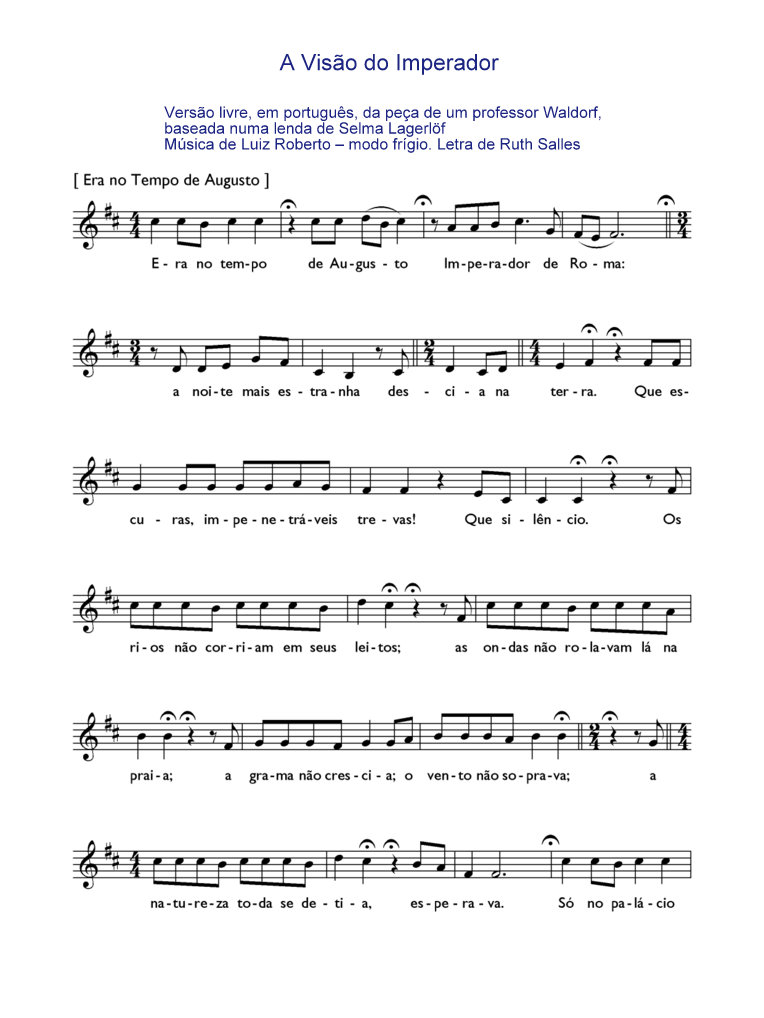
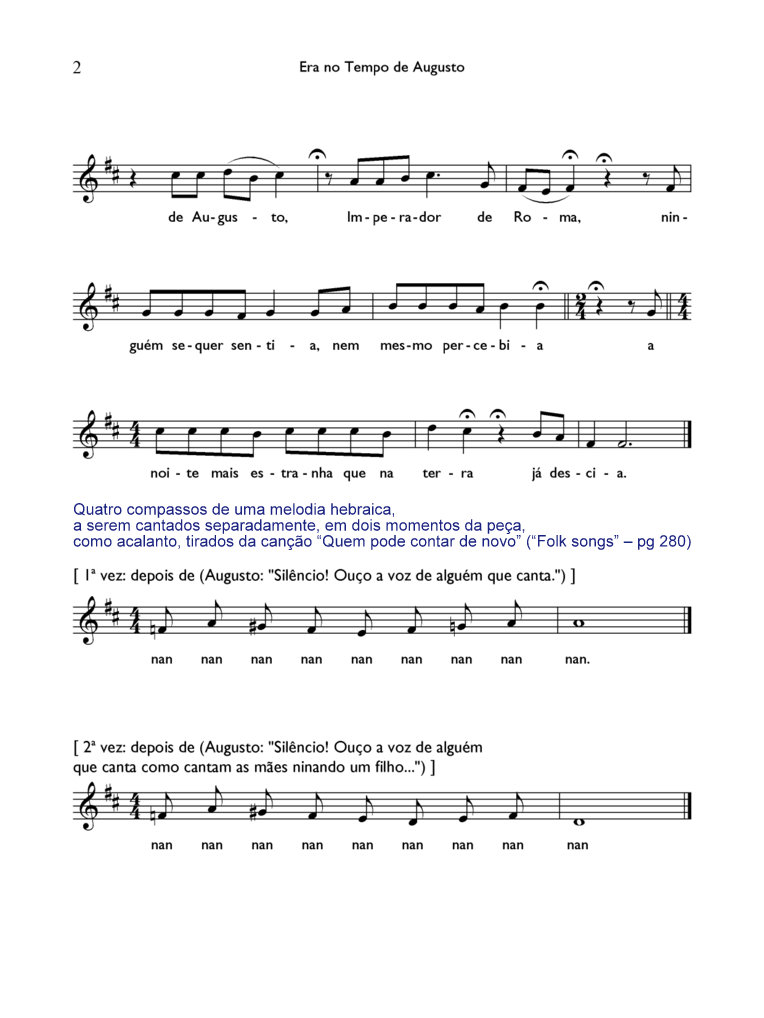
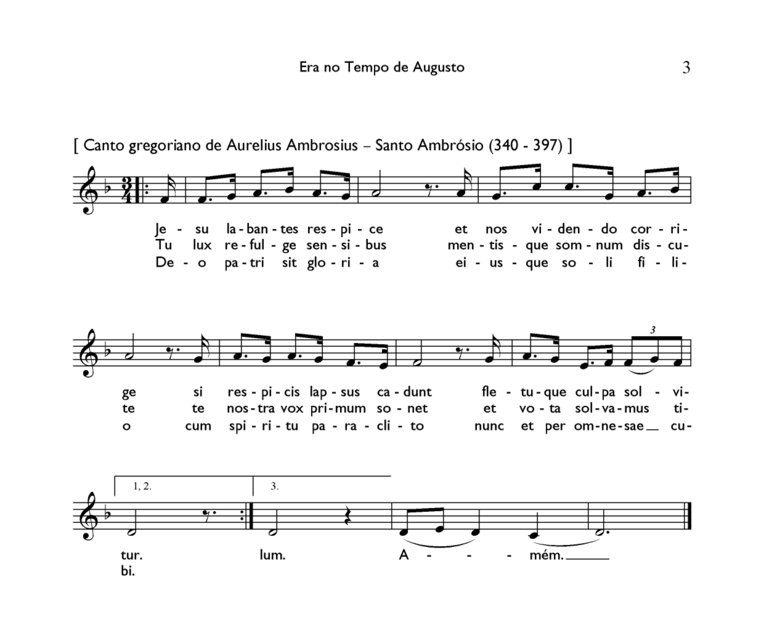
*1: LAGERLÖF, Selma. Christian Legends. Rio de Janeiro: Editora A Noite, 1930.
*2: LUSITANO, Leonel da Costa. Vergil's Eclogues and Georgics. Lisbon: Editora Lisboa, date n/d.
***


